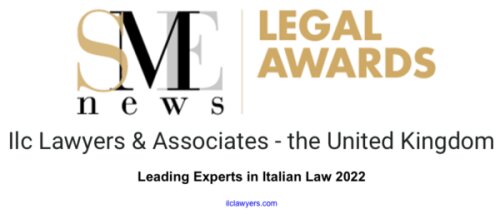Best Toxic Mold Lawyers in Palermo
Share your needs with us, get contacted by law firms.
Free. Takes 2 min.
List of the best lawyers in Palermo, Italy
About Toxic Mold Law in Palermo, Italy
Toxic mold, also known as black mold, can be a serious health hazard when it is present in homes or buildings. In Palermo, Italy, there are laws and regulations in place to address issues related to toxic mold and to protect individuals from its harmful effects. It is important to be aware of these laws and seek legal advice if you believe you have been exposed to toxic mold.
Why You May Need a Lawyer
You may need a lawyer for a variety of reasons related to toxic mold, such as determining who is responsible for addressing the mold issue, seeking compensation for damages caused by exposure to mold, or understanding your rights under local laws. A lawyer can help you navigate the legal process and ensure that your rights are protected.
Local Laws Overview
In Palermo, Italy, there are regulations in place that address the presence of toxic mold in homes and buildings. These laws may outline the responsibilities of property owners, landlords, and tenants when it comes to addressing mold issues. It is important to be familiar with these laws and seek legal advice if you believe you have been exposed to toxic mold.
Frequently Asked Questions
1. What should I do if I suspect there is toxic mold in my home?
If you suspect there is toxic mold in your home, you should contact a professional to conduct a mold inspection. It is also a good idea to seek legal advice to understand your rights and options for addressing the mold issue.
2. Who is responsible for addressing toxic mold in a rental property?
The responsibility for addressing toxic mold in a rental property may depend on the terms of the lease agreement and local laws. In some cases, the landlord may be responsible for addressing mold issues, while in other cases, the tenant may be responsible. It is important to review the terms of your lease agreement and seek legal advice if needed.
3. Can I seek compensation for damages caused by exposure to toxic mold?
You may be able to seek compensation for damages caused by exposure to toxic mold, such as medical expenses or property damage. It is recommended to consult with a lawyer to determine your legal options and rights in this situation.
4. How long do I have to file a legal claim related to toxic mold exposure?
The time limit to file a legal claim related to toxic mold exposure may vary depending on the specific circumstances of your case and local laws. It is important to consult with a lawyer as soon as possible to understand any deadlines that may apply to your situation.
5. How can I prevent toxic mold in my home?
To prevent toxic mold in your home, it is important to address any moisture issues promptly, ensure proper ventilation, and regularly inspect for signs of mold growth. If you suspect mold is present, you should contact a professional for inspection and remediation.
6. What are the health risks associated with exposure to toxic mold?
Exposure to toxic mold can lead to a variety of health issues, including respiratory problems, allergic reactions, and other medical conditions. It is important to seek medical attention if you believe you have been exposed to toxic mold and to address the mold issue promptly.
7. Can I be evicted for reporting toxic mold in my rental property?
In some cases, tenants may be protected from eviction for reporting toxic mold in their rental property under local laws. It is important to understand your rights as a tenant and to seek legal advice if you believe you are facing eviction for reporting a mold issue.
8. Are there government agencies that oversee toxic mold issues in Palermo?
In Palermo, Italy, there may be government agencies that oversee toxic mold issues and enforce regulations related to mold in homes and buildings. It is recommended to contact local authorities or seek legal advice to understand the role of government agencies in addressing mold problems.
9. What should I do if my landlord refuses to address toxic mold in my rental property?
If your landlord refuses to address toxic mold in your rental property, you may need to seek legal advice to understand your options for resolving the issue. This may include pursuing legal action against the landlord or exploring other avenues for addressing the mold problem.
10. How can a lawyer help me with toxic mold issues in Palermo?
A lawyer can help you navigate the legal process related to toxic mold issues in Palermo, Italy. This may include providing legal advice, representing you in negotiations with landlords or property owners, or pursuing a legal claim for damages caused by exposure to toxic mold. It is recommended to consult with a lawyer if you have questions or concerns about toxic mold in your home or property.
Additional Resources
For additional information on toxic mold in Palermo, Italy, you may consider contacting local health authorities, legal aid organizations, or environmental agencies. These resources may provide valuable information and assistance for individuals in need of legal advice or support related to toxic mold issues.
Next Steps
If you believe you have been exposed to toxic mold in Palermo, Italy, it is important to take action promptly to protect your health and rights. Consider contacting a lawyer who specializes in toxic mold issues to discuss your situation and explore your legal options. A lawyer can help you understand your rights, navigate the legal process, and seek justice for any damages caused by exposure to toxic mold.
Lawzana helps you find the best lawyers and law firms in Palermo through a curated and pre-screened list of qualified legal professionals. Our platform offers rankings and detailed profiles of attorneys and law firms, allowing you to compare based on practice areas, including Toxic Mold, experience, and client feedback.
Each profile includes a description of the firm's areas of practice, client reviews, team members and partners, year of establishment, spoken languages, office locations, contact information, social media presence, and any published articles or resources. Most firms on our platform speak English and are experienced in both local and international legal matters.
Get a quote from top-rated law firms in Palermo, Italy — quickly, securely, and without unnecessary hassle.
Disclaimer:
The information provided on this page is for general informational purposes only and does not constitute legal advice. While we strive to ensure the accuracy and relevance of the content, legal information may change over time, and interpretations of the law can vary. You should always consult with a qualified legal professional for advice specific to your situation.
We disclaim all liability for actions taken or not taken based on the content of this page. If you believe any information is incorrect or outdated, please contact us, and we will review and update it where appropriate.










